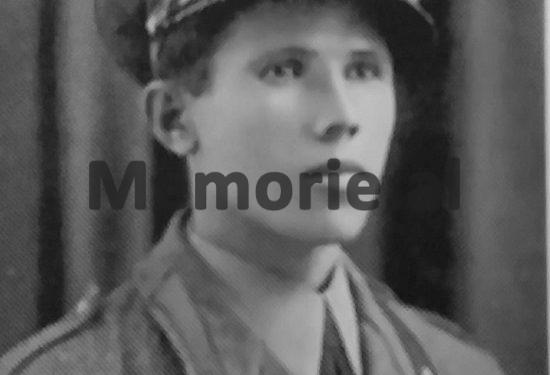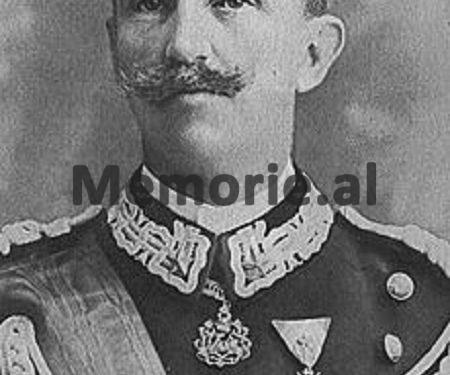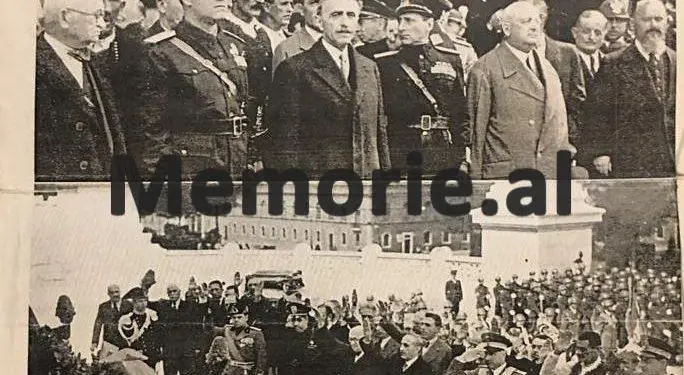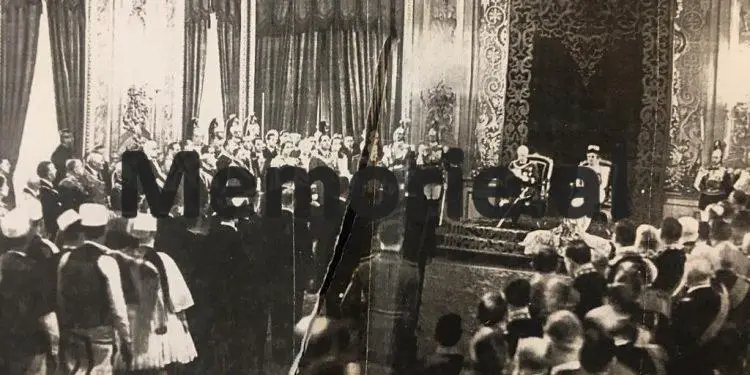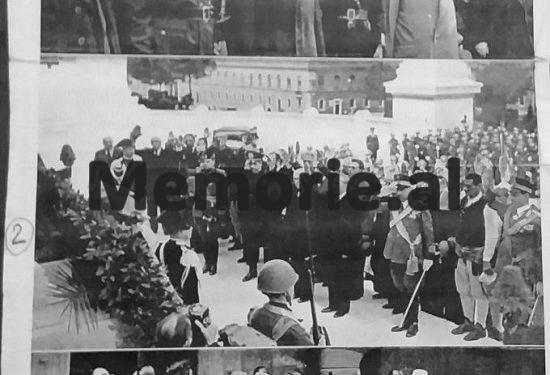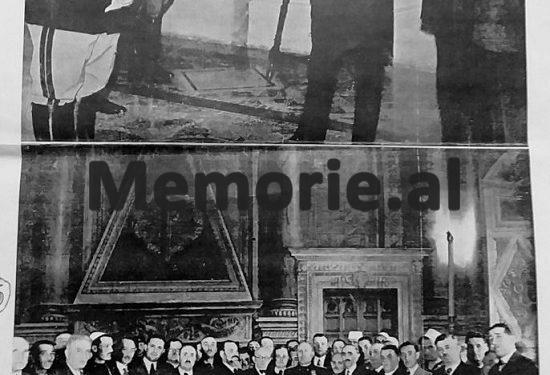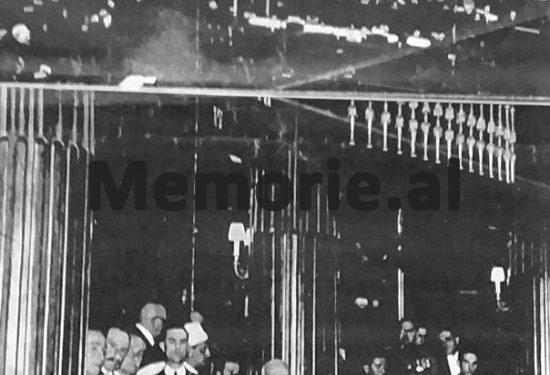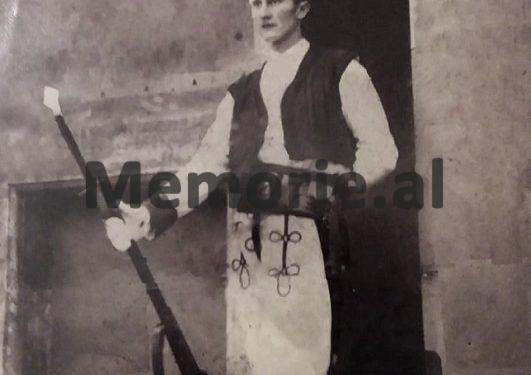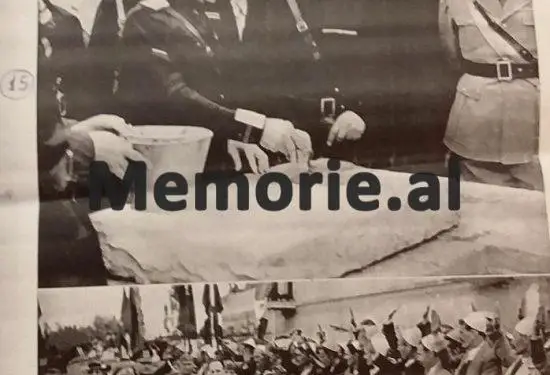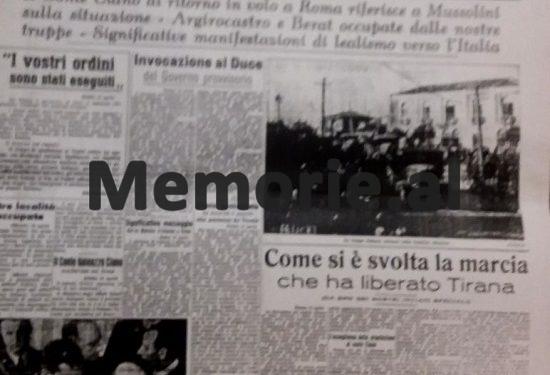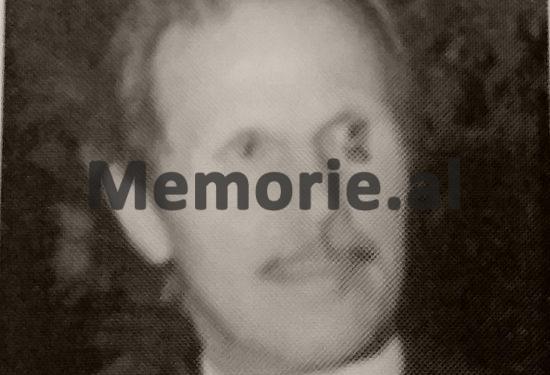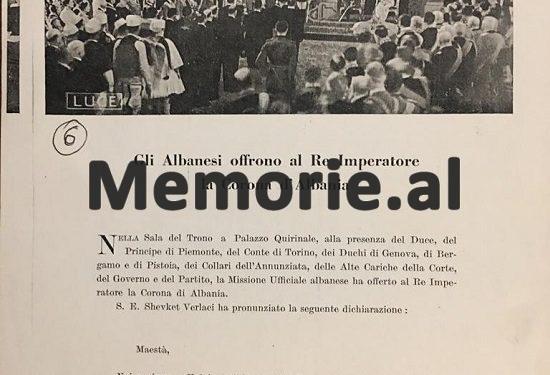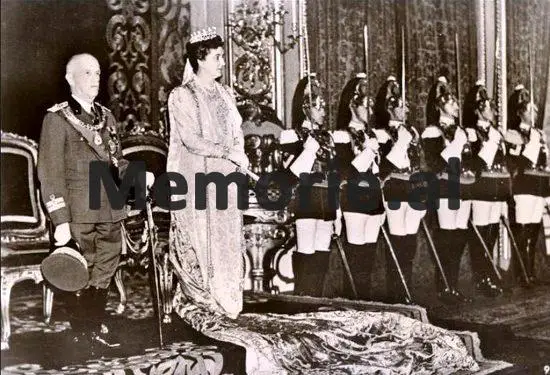Dashnor Kaloçi
The first part
Memorie.al publishes the unknown story of Todi Shyti, originally from the village of Krutje e poshtme in Lushnja and one of the poorest families in Myzeqe during the period of the Zog Monarchy, in April ’39, after the occupation of Albania by Italy fascist of Benito Mussolini, was assigned to the force of 1000 forces that the Albanian Government of Prime Minister Shefqet Vërlaci selected from all districts of the country, for the formation of the Albanian battalion of the Royal Guard, which then under the orders of the commander of the Italian-Albanian battalion, Colonel Alfredo D`Andrea, (who had served as an adviser to the Albanian National Army under Ahmet Zogu, during the Monarchy), was sent to Italy, where he served as an honor guard at the ‘Curinale’ Palace of King Victor Emmanuel III , until September 9, 1943, when in the early hours of the morning, the King, together with the Prime Minister, Army General Badoglio, left the ‘Curinale’ Palace and went to Brindisi. The rare testimony of Todi Shyti, who returned to Albania in 1993, after a long emigration to the USA where he had settled since 1948, where he tells how after meeting with Nesti Nasen and the financial assistance he gave to the mission Albanian at the United Nations, he was allowed to come to Albania several times since 1974, as well as his engagement with the Republican Party in the US where for several years he financed the electoral campaigns of that party, for which he received thanks from Presidents George Bush and Ronald Reagan.
“Our battalion, which constituted the Albanian National Guard, was stationed in the barracks of the ‘Granatieri Di Sardinja’ Regiment, which was located about three kilometers from the ‘Curinale’ Palace, which was the royal residence of Victor Emmanuel III, where we would perform the service of guard of honor. A few days after our arrival there, on May 9, which was the day of the proclamation of the Italian Empire, we made a military parade in front of Benito Mussolini and King Victor Emmanuel. We performed the service of honor guard at the Royal Palace dressed in the Albanian national costume, which was of two types; of the North and South of Albania. “Every time King Victor Emmanuel passed by us, he greeted us with his hand…”!
This is how Todi Shyti, originally from Lower Krushja in Lushnja, remembered that distant time, after returning to Albania from the United States of America where he had lived since 1948, who testified for the first time the whole life story since leaving the village in 1939, to join the Albanian National Guard of King Victor Emmanuel III and later emigrate to the United States, where he in addition to providing assistance to the Albanian embassy in The League of Nations regularly funded the election campaigns of Republican Presidents Ronald Reagan and George W. Bush and received letters of thanks and appreciation from them. For all these and more events and facts from his life, since the proposal made to him to come as a saboteur to Albania in 1948, the visit to the Albanian embassy in Italy in the early 70s where he asked visa to Albania, meeting and acquaintance with the Albanian diplomat Nesti Nase in the Albanian diplomatic mission to the UN, the financial aid he gave them, lunches and dinners of the Albanian mission staff at his home in New York, frequent visits to Albania after year 1974 and conversations with his family in the district of Lushnja, etc., etc., he knows us in this interview that Memorie.al publishes in two issues, starting from this article.
Mr. Shyti, first a short biography of you, so who is Todi Shyti?
I was born in the village of Krutje i Poshtëme in the district of Lushnja in 1917, whence the origin of my family. My father was called Llambi Shyti, and my mother Stasa Mone. Like many other families in our village, we lived in extreme poverty at the time. What we lived in and called a house was nothing but a hut, half covered with straw and the other half tiled. Often in the evenings when it rained, what fell outside fell on us and wet the mats we had instead of the mattress. From this poverty that had plagued our family, my father was forced to send me to look after the cows, and I did not go to school like all my peers. Nevertheless, I learned to read and write with the help of a friend who was older than me. Since I could not stand that miserable life, I left the village and tried some other jobs, such as in Lushnje and Tirana, making bricks or as a tailor’s assistant, but even that did not work for me and I was forced to return. in village.
What did you do when you brought them back to the village?
Around 1939, I started working as an assistant driver for a Lushnja resident named Gaq Pjetri, who also became the man who changed the course of my life.
How and under what circumstances did this happen?
During the time I was working as an assistant driver for Gaq Pjetr, he proved to be the kindest and most heartfelt man I have ever known in my life in Albania. Before I started working at Gaqi, I made concrete blocks at Vangjel Pupi in Lushnje. One day I begged him to give me some money, because as a young man I wanted to buy a new pair of clothes like all my peers. The Gospel not only did not give me, but mentioned an old jacket he had given me some time ago. My dream for new clothes was realized only by Gaq Pjetri, who gave me the money to buy new shoes. I mentioned the new clothes that Gaq Pjetri made for me, because they completely changed the course of my life.
A pair of new clothes changed the fate of your life…?!
Yes, because after the invasion of Albania by Italy in April 1939, where Victor Emmanuel III was proclaimed King of Albania, the Albanian Government of Prime Minister Shefqet Vërlaci decided to send to Italy a large group of young Albanians which would constitute the guard of honor of the King of Italy and Albania. Thus, in the framework of the formation of the Albanian Royal Guard, the Government of Shefqet Vërlac at that time requested from the Recruitment Office of Lushnja, 18 young boys to be educated, well dressed and handsome. Based on my dress at the time, as well as the fact that I had completed a one-year theater course in Tirana where I had excelled, the head of the Lushnja Recruitment Office chose me among the 18 young people required by Tirana. When we arrived in Tirana, Dr. Pavllo Flloko selected us by choosing only five of us (four from Lushnja and I from the village) who would leave for Rome. I was one of them, not that I had school, but the choice was made based on the look of the dress. From the selection that was made, I thought that the Albanian government wanted to send to Rome the best boys that Albania had, to honor him.
What happened to you next?
After the selection in Tirana, all of us who had gathered us from different districts of Albania, gathered us at Ali Rizai Barracks on the outskirts of the capital. There we were told that we would go to Italy to parade on the occasion of May 9, which Mussolini had declared the day of the Italian Empire, and we would return home again.
Who said those words to you?
These words were told to us by the commander of the Italian-Albanian Royal Guard battalion, Alfredo D`Andrea, who had served as an advisor to the Albanian National Army under Ahmet Zogu, during the Monarchy.
How do I continue the organization there?
After those courtesy speeches, at the barracks of Ali Riza, the Albanian battalion of the Royal Guard of Victor Emmanuel III, was completed with 1000 soldiers, officers and non-commissioned officers. Then with the trucks of the Italian army, we were sent to the Port of Durres, where a large ferry was waiting to transport us to Italy.
Where did you settle when you went to Italy?
After getting off the ferry at the port of Bari, we set off in the direction of Rome, on a journey that lasted about 7-8 hours. After making the necessary preparations, on May 9, 1939, we made the military parade in front of Benito Mussolini and King Victor Emmanuel III. After that, according to the word they told us, we would return to Albania, but fortunately this was not happening.
Why…?!
Before I tell you this, I wanted to tell you that when I went down to Italy and saw with my own eyes that reality, I said to myself that I would never return to Albania, which also came from suffering and misery. that I had passed there. So, after some time, an agenda was issued, which said that the entire staff of the Albanian battalion of the Royal Guard, would stay permanently in Rome and whoever wanted, would fill out the relevant forms. I, like everyone else, filled out those forms and I was also introduced to the rank of sergeant with the respective salary, for which I had done a one-year course in Albania.
How many people filled out the forms to stay in Rome next to that Royal Guard battalion?
With a few exceptions, almost everyone decided to stay there and fill out the forms. At the beginning, the 1000 Albanian forces of the Royal Guard battalion, placed us in Santa Croçe, in the eastern part of Rome near the Regiment “Granatieri Di Sardinja”. Our battalion was divided into several companies. The commander of the company where I and my friend from Lushnja, Reshat Bejko, was Adnan Ypi. Our Royal Guard Battalion that was stationed about three miles. away from the Curinale Palace, which was the presidential palace where King Victor Emmanuel III stayed, after some time he took the oath, where we swore that for the King of Italy and Albania, we would give our lives.
How do you remember the Royal Palace of Victor Emmanuel III at that time, where you were sent to guard and how was your treatment both financially and living conditions, compared to the Italian troops who served there?
The King’s Palace was very beautiful with six floors and occupied an area of 1 km. square. It was built in 1870, when southern Italy was united with northern Italy. The living conditions of our battalion left nothing short of those of the Italian army and the treatment we received from both the Italian military and the people was excellent and very humane. All of us Albanians, both ordinary soldiers and officers, were given a monthly salary of 300 to 700 lire, which was too much for us, because we had food and clothing for free. During the Christmas and New Year holidays, any of us Albanian soldiers who had ties to an Italian family were given permission to spend those holidays there.
In addition to guard service, did you do any military training?
Before we began our guarding service at the Royal Palace, which was given to us in the early days, immediately after the settlement, we began military training and marches to prepare ourselves militarily. After that, on April 18, 1939, we began guarding the King’s Curinale Palace, which we did in shifts, each with 100 soldiers.
Where did you perform the service, in what premises?
Our service of honor guard was done both outside the Royal Palace and inside it. During the first days of service near the Curinale Palace, we were accompanied by Italian soldiers to the places of service. Then, we did it ourselves, unaccompanied by them. Before we went there, near the Royal Palace of King Victor Emmanuel, almost all soldiers with all kinds of weapons in the Italian army, such as the Panther, the Militia, the Carabinieri, the Marina, the Pedestrian, etc., were on guard duty. All the effectives of these weapons together with us, continued to do the service of honor guard at the Royal Palace in turn.
Did you ever meet King Victor Emmanuel III?
During the whole period that our battalion of Albanians stayed there serving as honorary guards, that is, from April 18, 1939, until September 9, 1943, I never had the opportunity to meet with King Victor Emanuel. I do not know about other Albanians, but I believe that none of us had that opportunity, because he never had a lunch or dinner in honor of our battalion.
What about seeing him up close, did you have the opportunity to see him during that period of time served there?
Since we were serving there, we were given the opportunity to see him up close every time, but not to meet him. Whenever he passed by us, he would greet us with his hand while we did not move at all, but stood ready.
How did you receive the news when Victor Emmanuel III was assassinated in Albania by his young son, Vasil Laçi?
The news of the assassination of King Victor Emmanuel III during his visit to Albania by Vasil Laçi, we learned very quickly through the radio and the War Bulletin. Of course, the assassination attempt on him did not do us any good. This came from our young age, as we did not understand many things, but also from the propaganda by the Italian authorities that was done to us at that time, where, among other things, we were told that Albania and Italy were united in one., etc., etc.
More specifically, what propaganda did they make there about Albania and its King Ahmet Zogu?
The King of Albania Ahmet Zogu was not mentioned there at all, he was forgotten. During the different hours of study, we were often told that Albania was making significant progress and was developing a lot, since the day it was connected with Italy.
How do you remember the overthrow of Mussolini and the capitulation of fascist Italy in September ’43?
On July 25, 1943, Mussolini was arrested. This came after a few days ago the High Council of the Fascist Party, which consisted of 29 members, decided to dismiss Mussolini, as the Italian army was suffering heavy losses on all fronts of the war. After this decision, the dissatisfied Mussolini came to the Curinale Palace, to complain to King Victor Emmanuel III. At the time Mussolini came to the palace, King Victor Emmanuel gave orders to the carabinieri who arrested him, and Marshal Badoglio was appointed in his place.
How did you learn about Mussolini’s arrest?
We learned of his arrest through the radio and the military bulletin informing about everything.
The day Mussolini was arrested, were you Albanians on duty at the palace?
The day Mussolini was arrested, our battalion was out of service. That day the service turn was Italian.
Following the precipitation of the situation after the Allied landings in Northern Italy and Sicily, on September 9, 1943, in the early hours of the morning, King Victor Emmanuel III, together with the Prime Minister, Army General, Badoglio, left the Carinal Palace and went to Brindisi. The King’s aim was to save his head and be able to enter into contact with the Anglo-American allied forces, so that he could continue his reign. On the day that King Victor Emmanuel and General Badoglio left the palace, we Albanians were not on duty there, but we learned that there in the barracks of the “Granatieri Di Sardinia” Regiment.
What happened after the departure of King Victor Emmanuel?
The King’s escape was followed by the fall and total disintegration of the entire Italian army with soldiers and officers, where each left at his own expense, without any kind of command. Our National Guard battalion was also found in that quagmire of the army. Memorie.al
Continues in the next issue




